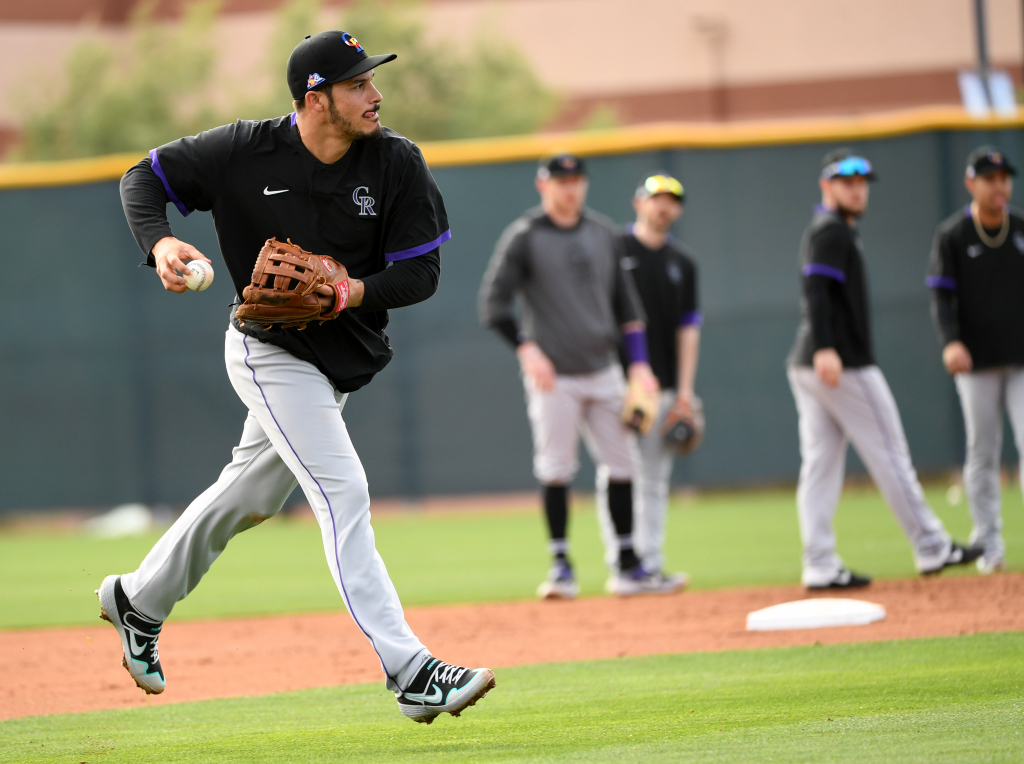Major League Baseball and the players’ union just went through weeks of very public and often antagonistic negotiations to get to this point: a three-week summer training camp, followed by a 60-game season.
Now comes the hard part.
With the coronavirus pandemic spiking throughout the country, players are scheduled to report Wednesday and begin practice Friday or Saturday. Players must not only get in shape for the season, they also must stay healthy. All players have been given a guidebook to health and safety protocols. The 100-plus page book includes color-coded charts, social-distancing workout diagrams and diagnostic questionnaires.
Spitting is, supposedly, prohibited, and clubs must provide expanded dugout and bullpen space at their ballparks.
But none of the safety measures will matter if players can’t change habits ingrained from their years in the clubhouse and dugout, on the field or out on the town. Rockies star third baseman Nolan Arenado says his teammates are up to the task.
“I think guys will handle it fine — it’s 60 games,” Arenado said Tuesday. “It’s challenging for sure, but it’s something we can accomplish together. We have to put the team and family first before we make any decisions.”
The Rockies already have been affected by COVID-19. All-star outfielder Charlie Blackmon is one of three players who have tested positive for the virus. Monday, veteran outfielder Ian Desmond said he won’t play this season, saying he’s not comfortable with the risks involved with the pandemic and citing the need to be with his young family.
Earlier Monday, Arizona Diamondbacks pitcher Mike Leake and Washington Nationals first baseman Ryan Zimmerman and pitcher Joe Ross announced that they are opting out of the 2020 season. There certainly is a chance others will also choose not to play, especially if more players test positive.
As Rockies general manager Jeff Bridich said: “We have to accept to a certain degree that we are not truly in control.”
Still, Rockies manager Bud Black expressed confidence about his players’ approach to health and safety.
“For me, we’re going to get a lot of education in the next week or so on the virus,” Black said. “I’ve been encouraged by what the players have said amongst themselves about how important this is for the next couple of months to do the right things off the field.
“I’ve heard a number of players say that they’ve talked to each other about the commitment to each other to be safe and do things within those guidelines off the field, whether it’s here in Denver or when we travel. It’s that individual commitment to the group effort.”
Bridich, however, added a sobering message.
“I think it’s on the entire organization to remember that this is not business as usual,” he said. “It’s going to be easy to fall into our normal rhythms and habits as we get back into practicing and playing games. But this isn’t business as usual. We need to do a good job of holding each other accountable for the protocols that have been put in place.”
Still, it seems unlikely that all of the players’ habits can be changed.
Asked specifically about how baseball is going to enforce the no-spitting rule, Black answered, “I’m not sure how that’s going to play out. I have not at the present time heard of any consequences if someone does spit, and I don’t know how it will be monitored.”
MLB Procedures for Health and Safety
Following are some guidelines Major League Baseball has issued as teams begin to practice in the midst of the coronavirus pandemic:
* Each club must submit a written COVID-19 action plan for approval by MLB.
* Spitting is prohibited (including but not limited to saliva, sunflower seeds, peanut shells or tobacco) at all times in club facilities (including on the field). Chewing gum is permitted.
* Pitchers may carry a small, wet rag in their back pocket to be used for moisture in lieu of licking their fingers.
* Clubs must provide expanded dugout and bullpen space at their ballparks.
* Players, umpires, and other on-field personnel should practice physical distancing to the extent possible within the limitations of competition and the fundamentals of baseball.
* Players on opposite teams should not socialize, fraternize, or come within six feet of each other before the game, during warm-ups, in between innings, or after the game.
* There will be no pre-game exchange of lineup cards. Instead, each club will input their lineup card into a mobile application provided by MLB.
Source: Major League Baseball



















